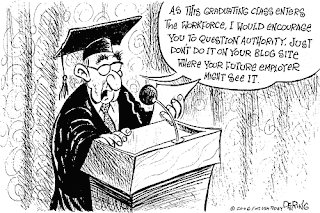Walter Williams writes
"A good part of our higher education problem, explaining its spiraling cost, is that a large percentage of students currently attending college are ill-equipped and incapable of doing real college work. They shouldn't be there wasting their own resources and those of their families and taxpayers."Absolutely true. For many students, a well-paying blue-collar job is all they want, and all they will want from life. And that's OK.
But Williams doesn't stop with that:
Another CCAP essay by Vedder and his colleagues, titled "From Wall Street to Wal-Mart," reports that there are "one-third of a million waiters and waitresses with college degrees." More than one-third of currently working college graduates are in jobs that do not require a degree, such as flight attendants, taxi drivers and salesmen. Was college attendance a wise use of these students' time and the resources of their parents and taxpayers?Well, no, not if you leave it at that. Why is the assumption that all those college graduates are stopping there or that the jobs that don't require a degree are anything other than temporary?
Why are you making the assumption that college was useless for them just because they are accepting a job at the low end of the scale? This used to be called "working your way up the ladder" and perhaps some few of the waiters and and taxi drivers were looking to remain there permanently, but all of them?
Colleges should refuse admission to students who are unprepared to do real college work. That would not only help reveal shoddy primary and secondary education but also reduce the number of young people making unwise career choices. Sadly, that won't happen. College administrators want warm bodies to bring in money.More importantly, why must college be the default?
So many people are being told that college is the only option for post-high-school 18 year-olds. It shouldn't be the default.
Not every kid belongs there ...
- right now ... maybe a couple of years from now, when he's more mature, has gotten a job and realized that he wants more?
- perhaps a technical school, certification program?
- at all .... not every kid has the chops to get a college degree ... and that's okay. Honesty in self-evaluation used to be considered a sign of maturity. Not every kid wants to spend $80k to get a degree when he could just start being a woodcarver/artist, logger, mechanic, plumber, heavy equipment operator, welder ... just like his dad.
- not at this time because he doesn't have the money, but he's going to work for a while and save up.



















